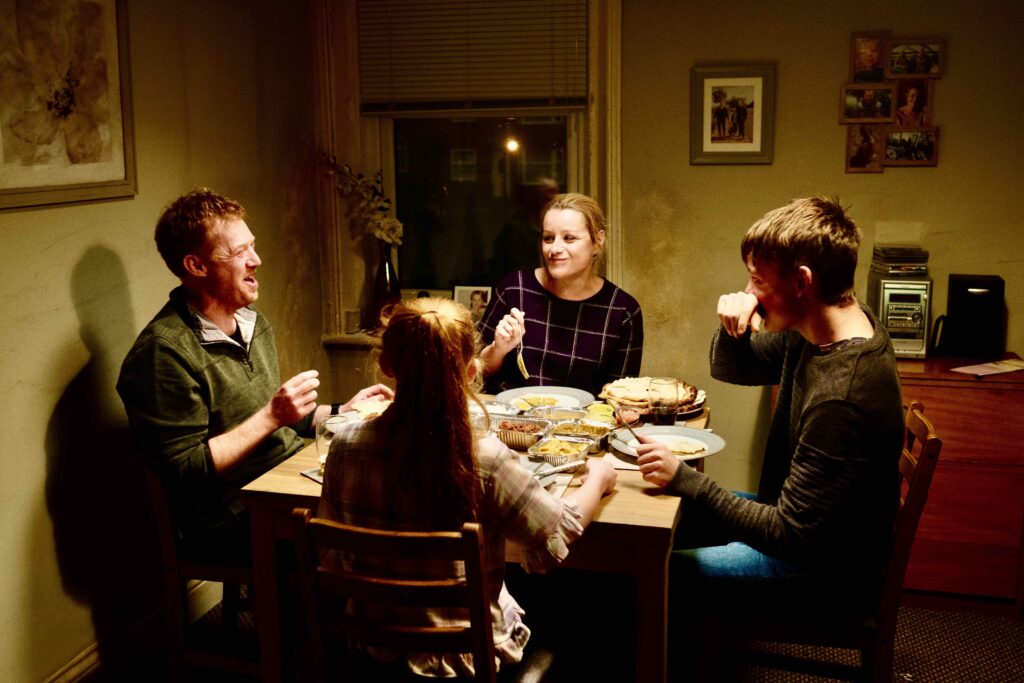
Director Ken Loach is a working-class hero. Hard to think of another filmmaker whose movies so vividly reflect the economic, societal and emotional challenges everyday people face. As they try to raise their families on low-paying wages and still maintain a grain of dignity and hope, he’s watching.
Ricky (Kris Hitchen) is the head of a household that lost their home in Newcastle, northeast England during the 2008 recession. The pressure is on him to hang on to their rental flat, even as they drown in debt. It’s a blow to his manhood that, while he is unemployed, his wife Abbie (Debbie Honeywood) is holding down a freelance job as a visiting health attendant.
She drives her car to each client, and it’s the family’s only transportation and their only asset. So, it is a testament to Abbie’s faith in Ricky that she begrudgingly lets him sell it so he can purchase a van and become an independent contract driver for a package delivery company. As luck would have it, his callous boss (Ross Brewster), the dispatcher, has no sympathy for his team. They drive their own vans, are bullied into delivering lots of packages in little time. No sick leave, paid holidays or benefits. Nothing.
God forbid Ricky should ask the wanker for time off for family emergencies. So, when Ricky’s rebellious and disrespectful 15-year-old son Seb (Rhys Stone) gets in trouble repeatedly at school, dad is exasperated. When his 11-year-old daughter Liza (Katie Proctor) starts wetting her bed stressed from tense family dynamics, her father is disheartened. And when Abbie cries because she can’t can handle the anxiety caused by two troubled children and an overworked husband, her man is distraught. Can he hold it together?
Uber and Lyft drivers and other contract workers facing the perils of a gig economy, live this life. For those who don’t, writer Paul Laverty (I, Daniel Blake) and Loach, in the most observant way, take you inside a rowhouse where a typical family struggles as they try to live a migrant worker’s existence.
Ricky and Abbie are one step ahead of the debt collectors. Their once amiable household is fractured. Symptoms of duress range from sullen rage, to babbling to strangers at bus stops about problems, to falling asleep at the wheel. Mom and the children aren’t sure they can pull their lives back together again. They all wish dad wasn’t overworked and could spend more time loving them, and so does he. As you’re sitting at their dining room table, watching them face turmoil, exhaustion and desperation you get the picture.
Beginning scenes are slow, and take their time setting up the characters, neighborhood, friends, colleagues and daily routines. Credit the script and director for starting off in the middle of the action, after their previous downfall. We come in as they try to pick up the pieces, getting more and more involved in their trauma as 1h 41 min rolls by at a solid pace (editor Jonathan Morris, I, Daniel Blake).
Location shots in Newcastle underline the blue-collar life. Health clinic waiting rooms, street scenes, patients’ homes, the delivery truck garage—all the sets and scenes look and feel authentic (production designer Fergus Clegg, art direction Julie Ann Horan). There is a sunny dreariness to the city that is artfully captured by cinematographer Robbie Ryan (The Favourite). Home and work life rhythms are accentuated by a subliminal musical score (George Fenton, Cry Freedom). The wardrobe (custom designer Jo Slater, I, Daniel Blake) swathes the characters in clothes that look like they came from a discount store.
Each of the four main characters are perfectly developed by talented actors who delve deep into their psyches. Ricky’s luck, as played by Hitchen, is a mounting string of misfortunate incidents and his outbursts emphasize that. Abbie’s breaking point is shown in heart-wrenching sobbing by Honeywood. Seb’s anger is held within; as his passive aggressiveness boils over, Stone’s poker face masks internal conflict. Proctor plays the very innocent Liza in ways that you’d never expect deception.
Separately the actors are quite convincing. In scenes where they interact, their characterizations are even more emotionally raw and moving. The intimacy between wife and husband, Abbie: “I had a horrible dream that we were sinking in quicksand and the kids had a branch and they were trying to pull us out.” The anger and disrespect between father and son. The obvious love and sensitivity between the siblings. All of it makes you wish their characters could find higher ground.
Guiding the lead actors, extras and excellent tech team through this ode to inhumane working conditions, is the master storyteller Ken Loach. His allegory specifically targets Great Britain, but the systemic difficulties it explores mirror workers’ problems around the world in a business climate that values them less and less.
The phrase “For whom the bell tolls” comes to mind. It’s like Ken Loach is ringing a church bell as loud as he can signifying that a way of life is dying.
Visit NNPA News Wire Film Critic Dwight Brown at DwightBrownInk.com and BlackPressUSA.com.